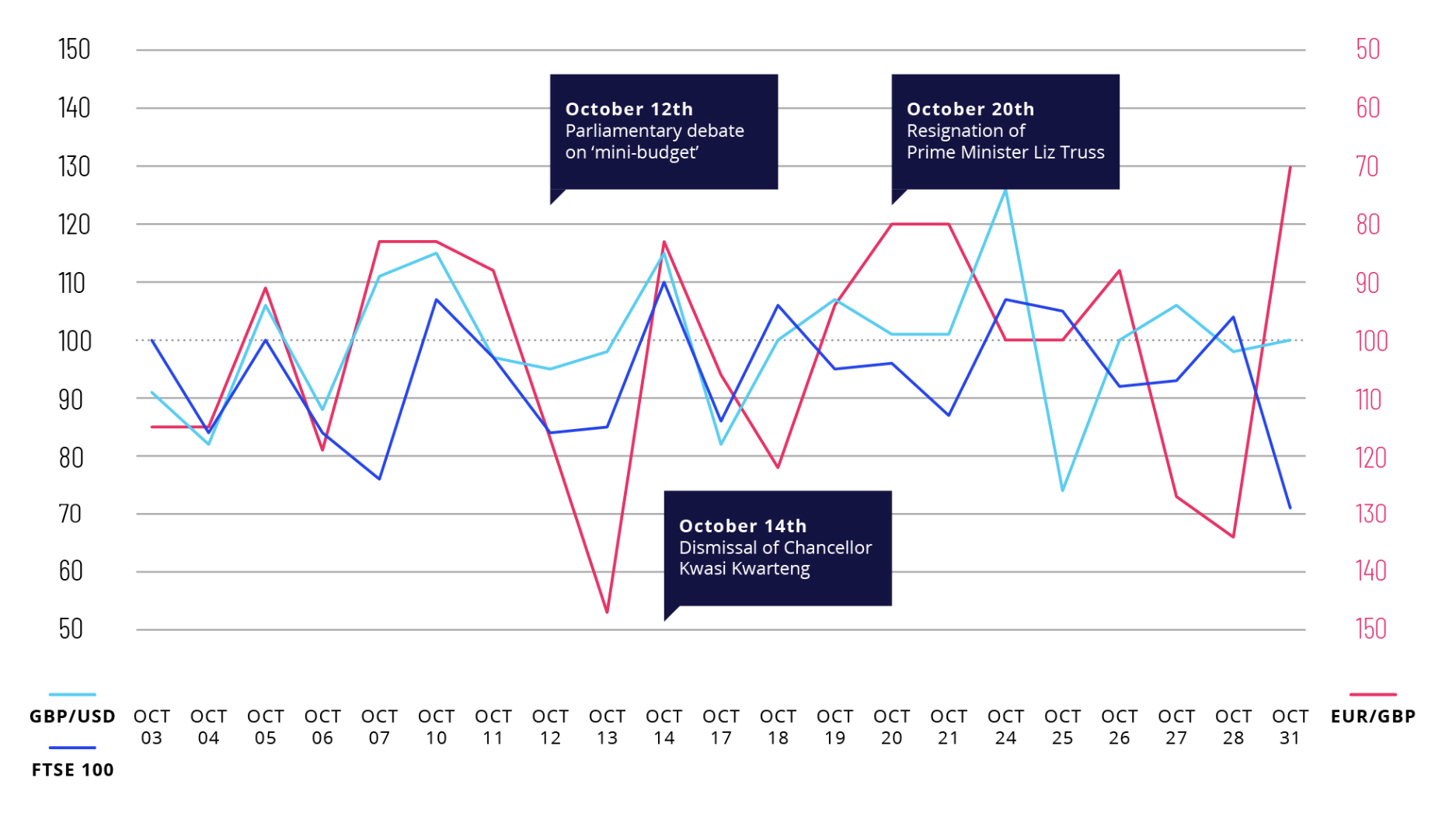-
UK ‘mini-budget’ provoked bearish sentiment towards FTSE index and the value of British Pound
-
Parliamentary speech on October 12th triggered growing distrust for UK-linked underlyings
-
Dismissal of Chancellor on October 14th saw first sign of market relief
-
Sentiment towards British Pound rises after Liz Truss resignation, but FTSE 100 falls
Spectrum Markets, the pan-European trading venue for securitised derivatives, has published its SERIX sentiment data for European retail investors for October, highlighting how actions taken by former Prime Minister Liz Truss affected retail investor behaviour towards the British Pound and FTSE 100 throughout the month, as reflected by the SERIX sentiment Index.
The SERIX value indicates retail investor sentiment, with a number above 100 marking bullish sentiment, and a number below 100 indicating bearish sentiment. (See below for more information on the methodology). During October all the UK’s key political developments were reflected immediately in FTSE 100 index sentiment which finished the month reaching a low of 71 points as well as for the currency pairs EUR/GBP and GBP/USD.
In a parliamentary debate on October 12th Truss sought to defend her mini-budget plan, even as the Pound continued to fall, with Labour MP Graham Stringer characterising her decisions as “an act of gross incompetence”. This debate was strongly reflected by the market: The SERIX for FTSE 100 dropped significantly in response, reaching 84 points, with sentiment on the Pound against both euro and dollar weakening as well.
The dismissal of Chancellor Kwasi Kwarteng on October 14th stabilised retail investor sentiment, and wider markets, but only for short time. After the first calls for Truss’ resignation started to emerge, sentiment once again collapsed.
"It is widely acknowledged that retail investors keep a close eye on major political decisions to inform trading strategy, and in today’s world of 24-hour news and interconnected global markets, it is not just domestic politics that holds their attention”, says Michael Hall, Head of Distribution at Spectrum Markets.
“The 45 days of UK Prime Minister Truss shows that European retail investors were closely following the signals coming out of London last month, with the SERIX readings as a seismograph of political action. Truss’s choices shook the whole of the European financial market, since UK is still a strong and influential economy. We hope that new Prime Minister Rishi Sunak will calm the waters and bring more stability,” adds Hall.
In October 2022, 142.5 million securitised derivatives were traded on Spectrum, with 36.4% of trades taking place outside of traditional hours (i.e., between 17:30 and 9:00 CET).
89.2% of the traded derivatives were on indices, 3.4% on commodities, 6.3% on currency pairs, 0.9% on equities and 0.2% on cryptocurrencies, with the top three traded underlying markets being S&P 500 (28.5%), DAX 40 (26.3%) and NASDAQ 100 (12.7%).
Looking at the SERIX data for the top three underlying markets, the DAX 40 turned bearish moving from 100 to 97 and the S&P 500 saw a similar decrease from 102 to a bearish 99. Meanwhile, the NASDAQ 100 decreased by two points to 100 shifting to neutral.

Calculating SERIX data
The Spectrum European Retail Investor Index (SERIX), uses the exchange’s pan-European trading data to shed light on investor sentiment towards current development in financial markets.
The index is calculated on a monthly basis by analysing retail investor trades placed and subtracting the proportion of bearish trades from the proportion of bullish trades, to give a single figure (rebased at 100) that indicates the strength and direction of sentiment:
SERIX = (% bullish trades - % bearish trades) + 100
Trades where long instruments are bought and trades where short instruments are sold are both considered bullish trades, while trades where long instruments are sold and trades where short instruments are bought are considered bearish trades. Trades that are matched by retail clients are disregarded. (For a detailed methodology and examples, please visit this link).
About Spectrum Markets
Spectrum Markets is the trading name of Spectrum MTF Operator GmbH. Headquartered in Frankfurt am Main, Germany, it is a pan-European trading venue for securitised derivatives aimed at financial institutions and their retail investors. Since launch, trading has been available in: Germany, France, Italy, Spain, Sweden, Norway, the Netherlands, Ireland, and Finland.
Acting as a MiFID II regulated trading venue authorised and supervised by BaFin, the exchange uses a uniquely open architecture system to allow investors to trade with increased choice, control and stability. Through its pan-European ISIN, 24/5 trading services and its own proprietary venue, Spectrum enables a guaranteed baseline level of liquidity over a range of products and is able to swiftly and safely match a significant number of orders and process multiple quotes every second.
Further information can be found at spectrum-markets.com
Media contact
Liminal
T: +44 203 778 1103
E-Mail: vasiliki@liminalcommunications.com
Disclaimer
All information contained herein is for information purpose only and addresses exclusively Members of Spectrum Markets and persons interested in becoming a Member of Spectrum Markets. Nothing herein constitutes an offer to sell or a solicitation of an offer to purchase any securitised derivatives listed on Spectrum Markets or any product described herein. Spectrum Markets does not provide financial services, such as investment advice or investment brokering. Prospective retail investors can trade such products only with their brokers. The information herein does not constitute investment advice or an investment recommendation. Any information provided does not have regard to the specific investment objectives, financial situation and needs of any specific person who may receive it. Turbo Warrants are complex financial instruments and investors may experience a total loss.



